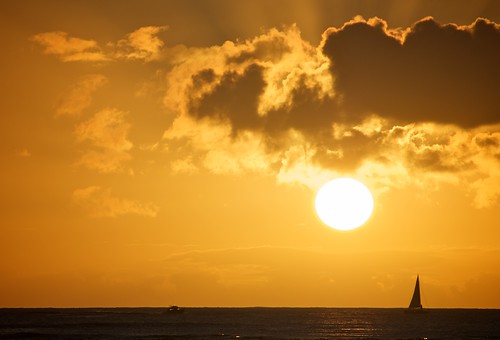Heavenly Bodies in the Pacific April 22, 2011
Author: Beach Combing | in : Modern , trackback
The meetings between Western explorers and Pacific peoples in the sixteenth through nineteenth centuries saw a whole host of misunderstandings. And among the most interesting of these was, on the Polynesian side, the question of where the outsiders – with their great sailing boats and white skins – came from.
Curiously, there are a rash of words and anecdotes that suggest that Pacific folk believed that the explorers arrived ‘from out of the sky’, though quite what is meant by this expression is a nice question.
The earliest such account is associated with Patagonia, 1519, and belongs to a passage that Beachcombing has examined on a previous occasion while enjoying the legend of Patagonian giants:
However, one day, without anyone expecting it, we saw a giant, who was on the shore of the sea, quite naked, and was dancing and leaping, and singing, and whilst singing he put sand and dust on his head. Our captain sent one of his men towards him, whom he charged to sing and leap like the other to reassure him, and to show him friendship. This he did, and immediately the sailor led this giant to a little island where the captain was waiting for him; and when he was before us he began to be astonished, and to be afraid, and be raised one finger on high thinking that we came from heaven.
Was this a misinterpretation on the part of the Europeans – a chance gesture by the native perhaps? Or did ‘the giant’ really believe that the visitors had dropped from out of the heavens? Beachcombing is increasingly struck reading this material by the way in which the westerners expected to be treated as divinities by the locals.
In any case, when we move onto later calls from Western ships on the Pacific Islands the sky constantly comes up. For example, in Samoa westerners (and their goods) were known as papalagi. This word and its origin has been much argued over. However, what seems certain is that, by the nineteenth-century, the Samoans interpreted it – correctly or as a folk etymology – as ‘people of the sky’.
There are two ways to look at this etymology. The first is to interpret sky as ‘heavens’ and have the Europeans as divinities, breaking their way in from another world: a folk European etymology of papalagi, much beloved of missionaries, was ‘sky bursters’! Here there are also the fraught debates around the word atua – the extent to which Europeans were believed by Polynesians to be gods, a subject already covered by Beachcombing a couple of months ago.
The other possibility is more mundane and is described by George Vason – a missionary who renounced Christianity in favour of a native wife! – in an episode relating to Tonga from the late eighteenth and early nineteenth century.
‘When the day declined, about seven o’clock, if they were not disposed to dance, they would retire to bed, or, more properly, to recline on their matting. But when they had retired, the most social employment of the day took place. As they lay reclining at their ease, Mulkaamair and his numerous household, that lay round him, would commence conversations, that amused them till they all fell asleep… When they were all lain down, the chief would say, ‘Tou tellanoa’. ‘Let us have some conversation.’ Another would answer, ‘Tou Tellanoa gee aha,’ i. e. ‘What shall we talk about’. A third would reply, ‘Tou Tellanoa ge papa langee’. ‘Let us talk of the men of the sky.’ They called us [i.e. westerners] ‘the men of the sky,’ because, observing that the sky appeared to touch the ocean, in the distant horizon, and knowing that we came from an immense distance, they concluded that we must have come through the sky to arrive at Tongataboo.
In these words then the ‘heavenly’ nature of the Europeans had more to do with them arriving from afar than with divinity.
Any other heavenly contacts in meetings between different parts of the world: drbeachcombing AT yahoo DOT com


